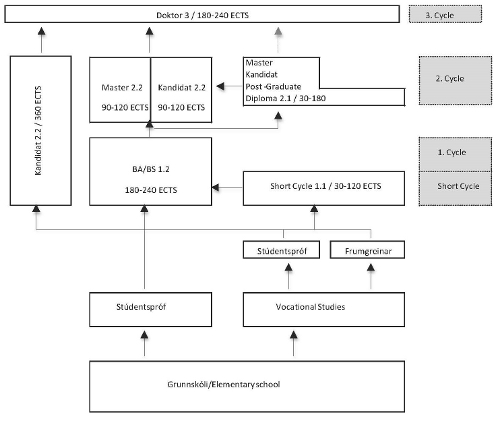1. Diagram of the Icelandic higher education system

2. Types of higher educational institutions
| National name | English name | Accreditation | NQF level | Types of qualifications offered |
|---|---|---|---|---|
| Háskóli | University, University College, Academy | Ministry of Education, Science and Culture | 5-7 | Diploma (first cycle), bachelor’s degree, master’s level diploma, kandidat degree, master’s degree, doctoral degree |
Higher education in Iceland is regulated by law no. 63/2006, Laws on Universities. Under the law, the Icelandic term “háskóli” is used to refer both to traditional universities and other types of institutions, i.e. the law does not make a distinction between universities and other higher education institutions. The institutions accredited as háskóli may offer first and second cycle studies in the fields of studies they are accredited for, but have to apply specially for accreditation for doctoral programmes.
3. Types of higher education
| Qualification | Qualification in English | Level EQF/ Cycle | Length ECTS | Access requirements | Access to further study |
|---|---|---|---|---|---|
| Diplómapróf | Diploma | 5/1.1 | 30-120 | Upper secondary | Bachelor’s degree |
| Bakkalárpróf | Bachelor’s degree | 6/1.2 | 180-240 | Upper secondary | Master’s degree |
| Viðbótarpróf á meistarastigi | Postgraduate Diploma/ Master’s /Candidatus degree | 7/2.1 | 30-360 | 30-180 ECTS Bachelor’s degree. 360 ECTS Upper secondary | Master’s degree (NQF 6.2) |
| Meistarapróf | Master’s / Candidatus degree | 7/2.2 | 90-120 | Bachelor’s degree | Doctoral degree |
| Doktorspróf | PhD degree | 8/3 | 180- | Master’s degree (NQF 6.2) | N/A |
There are two types of Candidatus degrees: a six year one tier programme in Dentistry and two to three year programmes in Psychology (2), Midwifery (2) and Medicine (3) after completion of a Bachelor degree.
A distinction is made between Candidatus and Master’s degrees with research component (ISQFHE level 2.2, ISQF level 6.2) and degrees based mainly on courses (ISQFHE level 2.1, ISQF level 6.1). The former give access to Doctoral studies, the latter usually not.
4. Qualifications framework
There exists since 2007 a qualifications framework for higher education (ISQFHE) with three cycles, where cycle one and two are divided into two subcycles (1.1, 1.2, 2.1 and 2.2).
The Icelandic Qualification Framework (ISQF, since 2016) has seven qualification levels. Higher education qualifications are at levels 5, 6 and 7 in the ISQF, with two sublevels at 5 and 6.
The learning outcomes for levels 5, 6 and 7 in the ISQF are condensed versions of the more detailed learning outcomes in the Icelandic National Qualification Framework for Higher Education (ISQFHE). Level 5.1 in the ISQF corresponds directly to cycle 1.1 in the ISQFHE, level 5.2 to cycle 1.2, level 6.1 to cycle 2.1, level 6.2 to cycle 2.2, and finally level 7 in the ISQF corresponds to cycle 3 in the ISQFHE.
Post-secondary non higher education is at level 4 of the ISQF. Higher education institutions may accept credits from this level into their programmes, and some of the higher education institutions offer programmes at this level (for example practical studies in Icelandic for foreign students).
5. Quality assurance and accreditation
Universities have to apply for institutional accreditation to the Ministry of Education, Culture and Science. The universities apply for accreditation in one or more out of six fields of studies (Natural Sciences, Engineering and Technology, Medical and Health Sciences, Agricultural Sciences, Social Sciences, Humanities). If accredited they can offer programmes at Bachelor‘s and Master‘s level in these fields. If they want to offer studies in another field they have to apply again for accreditation for that field, and they have to apply specially for accreditation for doctoral programmes.
A list of accredited universities in Iceland and the field they are accredited for is can be found here:
Quality assurance is run by the Quality Board for Icelandic Higher Education according to the Quality Enhancement Framework:
All the members of the Quality Board are foreign specialists.
6. Upper secondary qualifications giving access to higher education
| Name | Specialisation | Further study |
|---|---|---|
| Stúdentspróf (bóknámsbraut) | General education and general study preparation | All first cycle progr. |
| Viðbótarnám til stúdentsprófs | Additional studies for „stúdentspróf“ after vocational studies | All first cycle programmes* |
| Frumgreinadeildarpróf | University preparation studies for mature students | Many first cycle programmes |
* Except for Economics, Pharmacy and Dentistry at the University of Iceland.
The secondary school system in Iceland is now in state of change. The new programmes toward stúdentspróf will be three year programmes instead of the previous four year programmes. The yearly study load will be increased and some courses will be moved to compulsory school level. The number of credits in the new programmes will be somewhat lower than in the old programmes, but the content level should be the same.
The preparation studies are offered either by universities or in cooperation with universities. They are offered by three institutions, Bifröst University, University of Reykjavík and Keilir (in cooperation with the University of Iceland). In general the studies only give access to the university that offers the programme, but the universities may make agreements among themselves on access to programmes at other universities.
7. Useful links
–
